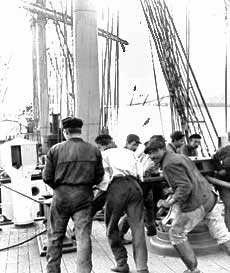Work,Fish,Women,$$ Janet
Let Us Work!
Leslie Leyland Fields captures the voices of women engaged in the commercial fishing industry in The Entangling Net – Alaska’s Commercial Fishing Women Tell Their Lives. Fields interviews eighteen women in an occupational life cycle manner, beginning with how the women acquired their jobs to speculation about what fishing will be like in the future. Fields’ narrative is an exposure to a completely different way of life; a hard way of life that is full of risks, harsh beauty, long hours and prejudice.
Fields interviews these women to give voice to the stories of differences and similarities between these fisherwomen. Each woman has a distinctively personal experience but all of the women battle similar adversities and encounter similar prejudices. Following the cyclical form of her accounts, the look for work is fraught with chauvinism. Even after a job was obtained, there would be comments – “We’d always get reactions like, “Oh, a woman! I’ll wait for Al (46).” In particular, Laurie Jolly and Rebecque Raigoza felt that perhaps the men didn’t think women would be capable in fishing jobs. In spite of this, the women felt a great sense of accomplishment and independence while working in their chosen field and paydays helped reinforced their choice. The negative reactions from male co-workers were never enough to dissuade them from their profession.
Another woman with seven years of prior fishing experience also found that finding fishing work in Alaska was less than easy. In relating her search for work, Virginia Adams said, “I pounded the docks and got the typical – I could go for half share and be really sweet with the captain (55).” Adams felt that this kind of attitude, or harassment, is something that you just have to put up with. The recipe for employment on the fishing boats was to make sure your skills are good and to keep your mouth shut. Adams felt the adage “You have to be twice as good” applies quite strongly here. Adams also felt that as long as the aggravation of having your competence questioned wasn’t too hard to deal with, it was worth the added hassle. For her, there was no other option available in this industry.
Similar obstacles were met by Lisa Jakubowski in her job. Jakubowski encountered harassment that was verbal and not physical, but the constant barrage of obscenities and undermining of any of her deck decisions served to make her job intolerable. Unlike Adams, Jakubowski was not willing to endure the verbal onslaught of insults and eventually quit the job. “They made me realize constantly that I was not one of them, I was something different (59).” The men thought it quite odd that a woman would want to work on a boat and constantly invaded her space. She felt that she made it clear their attention was not wanted but even the skipper did nothing to dissuade the male crew members from their constant pestering of her.
These few examples are cited to illustrate just some of the difficulties that women could expect to face while searching for fishing work. It was Fields’ own personal experience that prompted her to explore what other women in the fishing industry experienced. Prior to Fields, no woman in her new family had ever worked side by side with her husband until now. It was Fields immersion by marriage into this industry that sparked her curiosity about other fisher women. Fields slow battle for acceptance in her communal livelihood has slowly been accomplished.

